-
 Art of Wellness Acupuncture & Traditional Chinese Medicine (TCM)11704 Wilshire Blvd, Suite 295, Los Angeles, CA, 90025
Art of Wellness Acupuncture & Traditional Chinese Medicine (TCM)11704 Wilshire Blvd, Suite 295, Los Angeles, CA, 90025
myartofwellness@gmail.com310-451-5522 Office Hours
MonClosedTue7:30 am --4 pmWed7:30 am --4 pmThu7:30 am -- 4 pmFri7:30 am -- 4 pmSat7:30 am -- 4 pmSunClosedOur office opens from Tuesdays to Saturdays 7:30 am to 4 pm, will be closed on Memorial day, Independent day, Labor day, Thanksgiving day, Christmas and New year.
-
Recent Posts
- How to Treat Syncope With Acupuncture and TCM
- How to Treat Thoracic Outlet Syndrome With Acupuncture and TCM
- How to Treat Dupuytren’s Contracture With Acupuncture and TCM
- How to Treat Nutcracker Syndrome With Acupuncture and TCM
- How to Treat Rosacea With Acupuncture and TCM
- How to Treat Perioral Dermatitis With Acupuncture and TCM
- Lymphatic Drainage With Acupuncture and TCM
- How to Treat Turf Toe With Acupuncture
- How to Treat Nerve Pain With Acupuncture and TCM
- How to Treat Watery Eyes With Acupuncture and TCM
- How to Treat Ovarian Cysts With Acupuncture and TCM
- How to Treat Dystonia With Acupuncture and TCM
- Can Acupuncture Help Bad Breath?
- How to Treat Atopy with Acupuncture and TCM
- Plantar Fasciosis Treatment With Acupuncture and TCM
- How to Protect Yourself When Air Quality Is Poor
- Sign up to receive news and updates and get my free report:“The Top 10 Reasons to Try Acupuncture”

September 2025 M T W T F S S 1 2 3 4 5 6 7 8 9 10 11 12 13 14 15 16 17 18 19 20 21 22 23 24 25 26 27 28 29 30
Fertility
How to Treat Morning Sickness With Acupuncture and TCM
By Xiaomei Cai, L.Ac., Ph.D. & Qineng Tan, L.Ac., Ph.D.

Nausea or vomiting during the first few months of pregnancy, known as “morning sickness,” is experienced by more than half of all pregnant women. Severe nausea and vomiting, or morning sickness that lasts all day or further into pregnancy–called Hyperemesis Gravidarum—is less common, but can cause health problems for both the mother and the developing fetus. Acupuncture and TCM provide a natural and effective alternative for dealing with both mild and severe morning sickness.
“Morning sickness” is somewhat of a misnomer, although nausea during the first several weeks of pregnancy is often experienced early in the day, before eating. Having an empty stomach can exacerbate the queasy feeling of morning sickness. But why is it called morning sickness when it lasts all day? As many women know, morning sickness can strike at any time of day or night, and some women feel nauseous throughout the day.
The majority (at least 70%, maybe more) of all pregnant women experience some nausea during early pregnancy. Morning sickness usually begins occurring when a woman is around 6 weeks pregnant, and goes away by about the 12th week of pregnancy, or the transition into the second trimester. However, some women will continue to feel morning sickness later in pregnancy.
Medical science has not determined exactly what causes morning sickness, although it is generally thought to be related to changes in hormones, particularly an increase in hCG, known as the “pregnancy hormone.” A recent research study found that a specific genetic sequence present in some women may account for increased nausea during pregnancy. Some researchers at Cornell University have posited that morning sickness may be an evolutionary development that prevents harm to babies in utero by keeping the mother’s diet free of potentially toxic substances. They observed that in cultures where the staple diet relies more on starches and less on meat, pregnant women were less likely to experience morning sickness.
For most women, the morning sickness that occurs in the early months of pregnancy is not dangerous to their health or that of the fetus. However, feeling nauseous a lot of time is certainly uncomfortable. Some lifestyle habits can help get the nausea and vomiting under control. Acupuncture treatment and herbs can help even more to provide relief from the daily nausea of morning sickness.
For some women, morning sickness is more than just a nuisance. Not being able to keep any food down and vomiting repeatedly throughout the day for weeks or even months on end can cause serious health issues for mom and baby. Lack of proper nutrition, dehydration, and weight loss can lead to unwanted outcomes later on, including pre-term delivery and low birth weight of the infant. Hyperemesis gravidarum requires treatment. Acupuncture help for morning sickness is a natural alternative to drugs used to treat nausea.
Top 5 Symptoms of Morning Sickness
The symptom of nausea during early pregnancy is often what first lets a woman know she might be pregnant. Feeling queasy, dizzy, sensitive to smells, an aversion to certain foods, and occasionally vomiting are the most common signs of morning sickness. The sensations can be likened to those of motion sickness, or having a hangover. Many women report having a metallic taste in their mouth, and/or more saliva, which can contribute to feeling nauseated.
Severe morning sickness is a more serious problem. Signs of hyperemesis gravidarum include:
- Vomiting 3-4 times per day or more
- Feeling light-headed or dizzy after vomiting
- Dehydration: thirst, dry mouth, not having to urinate normally
- Heart beating fast, heart palpitations
- Losing weight during pregnancy (more than 10 pounds)
Some women may be at higher risk for hyperemesis gravidarum if they are: having multiples (twins or triplets), if their mother also had severe morning sickness (genetics), or if they generally tend to have a more sensitive stomach, even when not pregnant. Stress, lack of sleep, and hot weather can all trigger more nausea during pregnancy.
Medical Treatment for Morning Sickness
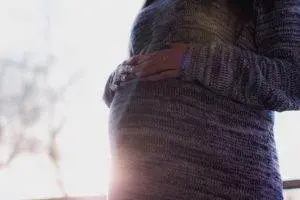
Nausea and vomiting during pregnancy is challenging to treat effectively, as care must be taken to avoid drugs that could harm the mother or the developing fetus. Often women are not treated for severe morning sickness until they have become so sick and dehydrated from vomiting that they need urgent care. At this point, a woman may need to be hospitalized and treated intravenously for dehydration.
There has been a somewhat standard practice of people recommending and using over-the-counter antihistamines or antiemetics like Pepto-Bismol to help quell nausea. In a 6-year study of women with hyperemesis gravidarum, researchers found that women who had used medications like Benadryl during pregnancy were more likely to experience adverse outcomes. A combination of vitamin B-6 and doxylamine is sometimes recommended. This drug combination is sold as an OTC sleep aid. Phenothiazine is sometimes prescribed for women with morning sickness, but it’s efficacy and safety for this use has not been studied extensively.
These medicines are used because they seem relatively risk-free, but they still carry the risk of side effects, like drowsiness, headaches, dry mouth, etc. In many cases, they are not totally effective. Acupuncture and TCM herbal formulations offer relief from nausea and other pregnancy issues without any negative side effects.
How Can Acupuncture Treat Nausea?
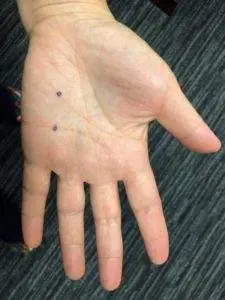
According to TCM, Qi (life force energy) moves through the body along meridians, channels that connect the organ systems. The Chong meridian connects the reproductive organs to the brain and the heart. This particular energy channel is related to all concerns having to do with female reproductive health and gynecological conditions, including menstruation and pregnancy. Its relation to the heart means that it is also connected to feelings of anxiety, panic attacks, and palpitations.
Each woman’s experience of morning sickness is different, so a TCM practitioner will look carefully at each individual patient to determine the specific imbalances causing the nausea and address them appropriately with acupuncture and herbs.
In TCM theory, morning sickness and hyperemesis gravidarum are related to the stomach, spleen, and liver. When a woman becomes pregnant, blood and Qi are strongly directed towards the pelvic area to nourish the womb (uterus) and the developing fetus. This surge of energy will also affect the digestive organs, potentially causing stomach problems. This is more likely to happen to women who have had weak digestion previously, perhaps due to a lack of proper functioning of the spleen. Likewise, the direction of more blood to the reproductive organs can cause a decrease in Yin energy in the Liver, thus increasing Yang energy. Liver fire can also trigger imbalance in the Stomach, leading to nausea and vomiting.
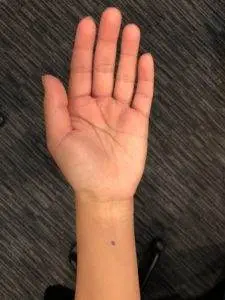
A specific acupressure/acupuncture point on the wrist is especially helpful for reducing nausea. This acupoint is known as PC6, or Nei Guan, 内关, which translates as “Inner Pass.” You may have seen special bracelets or wristbands recommended to help reduce nausea due to morning sickness (or motion sickness or postoperative nausea related to opioid medications). These products are designed to stimulate this acupressure point for nausea. While applying gentle pressure to this point can certainly be beneficial for women experiencing morning sickness, acupuncture treatment that includes this point and others is even more effective.
A systematic review of published studies related to the use of PC6 stimulation for nausea and vomiting found that this treatment produces clinically effective results, not only for pregnant women, but also for patients in cancer treatment and other people experiencing severe nausea.
A randomized trial conducted in Sweden to study the use of acupuncture treatment in conjunction with standard medical treatment for women with hyperemesis gravidarum found that acupuncture was not only very safe and free of side effects, but that women who received acupuncture were able to get over their severe nausea and vomiting more quickly than women getting only the standard treatment.
A study conducted at a maternity hospital in Australia compared women who received acupuncture for morning sickness to groups receiving placebo treatment or no treatment. The women who received acupuncture reported significantly less nausea and retching.
Top 5 Tips to Help Morning Sickness

Naturally, pregnancy is a time to embrace new lifestyle habits that are beneficial to both mother and baby. Eating a healthy diet during pregnancy can be especially difficult if you are feeling nauseous. Getting enough nutrition and rest during pregnancy is vital.
- Eat plain, “bland,” warm foods. Avoid anything that is spicy, salty, fatty, fried, or cold.
- Eat smaller meals/snacks at regular intervals throughout the day, so as to avoid the stomach being empty or too full, and to keep blood sugar levels steady.
- Sip water slowly and regularly. Don’t gulp down large amounts of liquid all at once.
- Sip ginger tea, made by steeping a few slices of fresh ginger.
- Actively prioritize stress reduction. Anxiety can exacerbate the nausea of morning sickness. Take frequent rest breaks. Ask your TCM provider to show you some gentle meditative exercises like Tai Qi or Chi Gong that can help relieve stress and nausea.
Talking with a trusted healthcare professional who understands what you’re going through can be helpful for calming anxieties about your pregnancy. Finding an experienced acupuncturist who can help you through any and all of the symptoms and worries that may come up during pregnancy, birth, and postpartum care can help to ease stress and discomfort.
Acupuncture Near Me for Morning Sickness
Acupuncture is an excellent modality not only for helping to relieve nausea due to morning sickness; TCM is a holistic form of medicine that can help women throughout pregnancy. Many discomforts and concerns may come up as a woman anticipates birth. Working with an integrative health provider who has a thorough understanding of gynecology and obstetrics from both Eastern and Western medical points of view can be beneficial to the physical and emotional health of both mother and baby. At Art of Wellness, we have over 30 years of experience helping women attain better reproductive health: from painful periods, to fertility issues, through pregnancy, postpartum, and menopause.
*This article is for education from the perspective of Traditional Chinese Medicine only. The education provided by this article is not approved by FDA to diagnose, prevent, treat and cure human diseases. It should not stop you from consulting with your physician for your medical conditions. Traditional Chinese Medicine is based on Qi, which is an invisible force that usually cannot be observed by modern science. Because science focuses on testing ideas about the natural world with evidence obtained through observation, these aspects of acupuncture can’t be studied by science. Therefore acupuncture and Chinese herbs are often not supported by double-blind, randomized trials, and they are considered alternative medicine therapies in the United States.
How To Treat ED With Acupuncture and TCM
By Qineng Tan, L.Ac., Ph.D. & Xiaomei Cai, L.Ac., Ph.D.
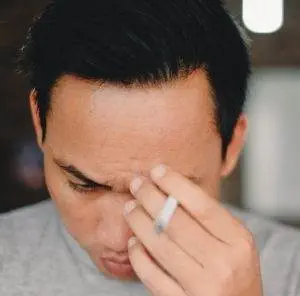
Let’s face it: most men have probably had trouble getting hard on occasion, but if it’s happening 50% of the time, or more often, then it may be a sign of men ED, or erectile dysfunction. ED refers to the inability to get or maintain an erection, making it difficult to have sexual intercourse. Acupuncture and TCM offer a natural solution for low sex drive and reproductive health problems, without over the counter ED pills.
In the past few decades, this condition, which used to be referred to as “impotence,” has come to be perceived as a men’s health issue or a men’s fitness issue that can be treated medically, rather than a personal problem. While it’s great that men can get help from doctors for this condition without embarrassment or shame, ED medications may not solve the problem for everyone. Stress, hormones, nutrition, exercise, emotions, and relationship dynamics all play a role in ED. ED can have a serious impact on a man’s quality of life, as it affects self-esteem, romantic relationships, and sperm count, and fertility.
It is estimated that about 30 million men in the U.S. experience erectile dysfunction (ED). By age 60, over 40% of men will probably experience ED. While ED drugs and over the counter ED pills help some men with ED symptoms, many men cannot use these medications because they interfere with others that are commonly used to treat heart disease. Acupuncture and TCM provide an alternative treatment for ED that can help men with this issue.
Top 10 Causes of ED
ED is a complex problem, which can involve both physical and mental components. A physical problem that causes a man to experience ED a few times may lead to emotional stress around sex and low sex drive, making the problem worse. Because the brain and hormones contribute so vitally to arousal and erection, sometimes depression, anxiety, or interpersonal feelings are the main cause of the issue. Some of the most common physical causes of ED include:
- Heart problems, high blood pressure, clogged arteries, high cholesterol
- Diabetes
- Obesity
- Use of certain prescription medications (antihypertensives, antidepressants)
- Neurological conditions, such as Parkinson’s disease or Multiple Sclerosis
- Alcoholism or excessive consumption of alcohol
- Smoking cigarettes/tobacco
- Prostate problems like BPH (enlarged prostate), or prostate cancer
- Lack of sleep, sleep disorders
- Low testosterone
Sometimes erectile dysfunction is the reason men discover that they have a heart condition or diabetes that they didn’t realize they had. When high cholesterol causes plaque to build up in the blood vessels, it’s not only the heart that is affected. Atherosclerosis (narrowing of the arteries) can also affect a man’s ability to get an erection by restricting blood flow to the penis. Inability to maintain an erection can be a sign that a man has hypertension.
What Is the Treatment for ED?
The most common medical treatment for men with ED are PDE-5 medications (like Viagra, Cialis, or Levitra), which work to dilate the blood vessels that supply blood to the penis. These ED drugs lower the blood pressure, which is why they cannot be used in conjunction with some other medications, including nitroglycerin or Imdur. If a man were to take both his ED pills and these medications, it could cause dangerously low blood pressure.
Some men experience side effects of taking these ED meds, including: headaches, blurred vision, dizziness, hot flushes, muscle pain, and diarrhea. In rare cases, men may have a painful erection that lasts longer than four hours (priapism), which can require medical treatment and/or cause permanent damage. If necessary, a doctor may numb the penis and use a needle to drain the blood that is trapped there, or use decongestant medications to help relieve the swelling. Other forms of therapy for ED include penile implants and penile injections. TCM acupuncture treatment for ED does not involve any needles inserted into the penis itself.
How Can Acupuncture Help ED?

According to TCM theory, ED is classified as a Jin Wei disorder and can follow one of a few patterns:
- Liver qi stagnation
- Blood stasis
- Kidney deficiency
TCM also acknowledges that stress, emotional and mental health disturbances are often a primary cause of ED, and seeks to incorporate counseling and awareness-building, both with the patient, and with the patient’s partner, if applicable. Sessions with a TCM provider usually involve plenty of discussion and feedback; patients feel heard and understood, which can go a long way towards relieving anxiety surrounding the ED or other sexual disorders.
TCM treatment for ED will include both acupuncture and herbs, which, combined, help to address the weakness or blockages that have developed around the liver and kidneys, strengthening the liver qi, relieving stagnation, and clearing dampness.
One study showed that, after a course of treatment including 3-5 acupuncture treatment sessions and daily herbal supplementation, almost half of the men reported satisfaction with the results.
Another study found that about two-thirds of the men who received TCM treatment reported feeling that they were “cure,” while the other third reported improved erections, but still felt that they needed more help. The group who received placebo treatment did not report improvement.
Top 5 Tips for ED Men’s Fitness

The desire to overcome ED and get your sex life back on track can be a great motivation to clean up your diet and get rid of habits you know have been holding you back from peak men’s health. Your acupuncturist can help you plan the best diet for men to help regulate hormones, reduce cholesterol, improve circulation, boost heart health and energy.
- Eliminate alcohol, tobacco, and other recreational drugs. You may feel like these substances help you to relax and get in the mood, but on a deeper physiological level, they are compounding the problem.
- Get more exercise. Ideally, balance cardio with some weight training. Losing fat and building muscle will help to balance the hormones and increase testosterone levels.
- Take care of your mental health and emotional well-being. Foster open and honest communication about ED with your partner. Acquaint yourself with men’s and women’s health issues, so that you can care for each other with empathy.
- Reduce stress. Prioritize a balanced, healthy lifestyle. Making time for yourself through regular exercise, meditation, and healing modalities like acupuncture can help improve your performance in all other areas of your life
- Get adequate sleep. When the body doesn’t get the deep rest it needs, it can lose all kinds of functionality.
Acupuncture Near Me for ED
ED is a sensitive men’s health issue. Knowing that it’s a common problem that affects lots of other men may help a little, but if ED is becoming a sexual problem that is negatively affecting your life and relationships, it’s worth it to seek out help for erectile dysfunction. If conventional medical treatment for ED isn’t working or isn’t an option, or if you want to take a more holistic approach that will help also boost your fertility and longevity, consider acupuncture treatment for ED.
*This article is for education from the perspective of Traditional Chinese Medicine only. The education provided by this article is not approved by FDA to diagnose, prevent, treat and cure human diseases. It should not stop you from consulting with your physician for your medical conditions. Traditional Chinese Medicine is based on Qi, which is an invisible force that usually cannot be observed by modern science. Because science focuses on testing ideas about the natural world with evidence obtained through observation, these aspects of acupuncture can’t be studied by science. Therefore acupuncture and Chinese herbs are often not supported by double-blind, randomized trials, and they are considered alternative medicine therapies in the United States.
How to Treat Leiomyoma of the Uterus With Acupuncture and TCM
By Xiaomei Cai, L.Ac., Ph.D. & Qineng Tan, L.Ac., Ph.D.

Heavy bleeding, menstrual cramps, long periods? This could be a sign that a woman has leiomyoma of the uterus. Also known as uterine fibroids, leiomyomas are growths or benign tumors in or on the wall of the uterus. TCM and Acupuncture provide a natural alternative treatment that can help relieve uterine fibroid symptoms.
A leiomyoma, in general, is a growth in smooth muscle tissue. Leiomyomas can develop in any muscle tissue in the body, including that of the intestines, esophagus, and under the skin, but the most common type of leiomyoma occurs in the uterus.
Many women have uterine fibroids and aren’t aware of them. It is estimated that 60-80% of women will have leiomyomas of the uterus at some point during their reproductive years (“childbearing age” – anytime from menarche to menopause). Only about 30% of women report symptoms of fibroids to their doctor, though, because many women do not notice any signs of leiomyoma of the uterus. It is probably rare for someone to have a single fibroid tumor; usually, there are multiple tumors. Fibroids can be hereditary; if your mother had them, you may be more likely to have them, too.
Fibroid tumors can grow inside the uterus, or on the outside of the uterine walls. Sometimes they stay small, and in many cases they don’t cause problems. In some cases, though, they can grow large and press against other internal organs. Fibroids of any size can cause symptoms like painful or irregular periods, abdominal bloating, back pain, and bladder problems.
The primary sign that a woman has uterine fibroids is heavy bleeding during menstruation. In many cases, doctors will say that there is no need for medical intervention. Sometimes hormone suppressing medications are used to try to slow the growth of the tumors and reduce the period-related symptoms. In about 20% of cases, people opt for surgery to remove fibroids. Often the fibroids stop growing and may even shrink after menopause. It is extremely rare for leiomyomas of the uterus to become cancerous. However, uterine fibroids can cause women so much pain that it becomes disabling.
Fortunately, there is natural treatment for fibroids with TCM. Acupuncture and herbs are excellent modalities for helping all kinds of womens’ health issues related to the female reproductive organs. TCM doctors have been observing and treating growths in the pelvic area for many centuries. Acupuncture and herbs can help women with leiomyomas of the uterus, as well as related issues such as, PMS, endometriosis and ovarian cysts.
Top 10 Signs of Fibroids

In many–if not most–cases, women do not realize they have fibroids, either because they have no symptoms, or they don’t notice the signs as being something out of the ordinary. Some women will feel these symptoms of leiomyoma of the uterus:
- Heavy menstrual bleeding, heavy periods
- Longer periods
- Irregular menstruation, irregular periods, spotting
- Feeling pressure in the pelvic area, fullness in the belly
- Frequent urination (have to pee all the time)
- Urinary retention (having trouble peeing)
- Low back pain, hip pain
- Constipation
- Enlarged abdomen, belly bloated
- Pain during sex
The sort of heavy bleeding caused by fibroids can lead to anemia. Some fibroids can grow as large as a grapefruit, which clearly is going to cause distension in the abdominal area and put pressure on the other pelvic organs and blood vessels, potentially causing a lot of dysfunction and discomfort. But the size of a fibroid is not necessarily an indicator of whether it will cause painful periods or heavy bleeding. Even small leiomyoma of the uterus can cause pain and excessive bleeding. Emotional imbalance can also be a symptom of uterine fibroids. Leiomyomas of the uterus can cause difficulties during pregnancy, and in some cases, have a negative impact on fertility.
What Is the Treatment for Fibroids?
Sometimes a doctor may discover larger leiomyomas while doing a routine pelvic exam. When women seek medical treatment for fibroids, diagnostic imaging (ultrasound, CT, sonography, MRI, or x-rays) will be used to try to determine the location and size of the growths.
Current medical science does not provide a clear explanation for what causes leiomyomas to grow in the uterus; it is only understood that estrogens seem to contribute to their growth, so the first line of treatment usually focuses on trying to alter the levels of female hormones in an effort to slow the development of the fibroid tumors.
Hormone medications, oral contraceptives, and even hormone-releasing IUDs are often prescribed to help control the heavy periods (cause spotting or no periods). These drugs do not do anything to change the fibroids themselves, though, and obviously, they are not suitable solutions for women who have plans to become pregnant.
For women whose bleeding is so excessive that it becomes disabling, Lupron may be recommended. Lupron acts upon the pituitary gland to turn off estrogen production, which can essentially start early menopause. Many women experience menopausal symptoms like hot flashes and headaches while taking Lupron. It is usually prescribed for women who are planning on undergoing surgery, as it can temporarily reduce the size of the leiomyomas to make them easier to remove. It is not viable as a long-term treatment on its own, though; as soon as a woman stops taking the medication, the fibroids will grow back.
There are relatively non-invasive surgery techniques that are able to remove fibroids while preserving the uterus; this is called myomectomy, which can be performed via incision or laparoscopically. Uterine Artery Embolization (UAE) is a newer procedure that blocks blood flow to the leiomyomas by injecting particles into the arteries connected to them. Some women opt to have a hysterectomy, a major surgery to remove the entire uterus, to get rid of fibroids for good.
Unfortunately, many women think that painful periods and heavy bleeding during periods is normal. Heavy periods may be common, but they are not “normal” or necessary. Women do not have to suffer with terrible cramps and lose a lot of blood every month. TCM herbs and acupuncture offer a natural way to get relief from painful periods and reduce fibroids.
How Can Acupuncture Help Fibroids?

In TCM, we have a category of disorders that we classify as “Zheng Jia,” which mean “masses.” This umbrella concept covers all the womens’ health issues that stem from growths or tumors that affect the female reproductive system, including uterine fibroids, ovarian cysts/PCOS, endometriosis, and reproductive cancers.
According to TCM theory, Zheng Jia disorders arise from internal factors such as blood stasis,/phlegm (spleen deficiency), liver stagnation (fire), and cold uterus.
Top 3 Factors Causing Fibroids According to TCM:
- Blood stasis/Liver Stagnation – Qi (life force energy) helps blood to flow. If Qi is blocked, blood flow gets stuck. Good Qi flow relies strongly on the liver and the emotions related to it. People who tend to have negative PMS symptoms like irritability, breast tenderness, and cramping probably have compromised liver Qi due to long-term stress. Liver Qi stagnation leads to blood stasis, which contributes to the formation of the fibroid tumors. Presenting symptoms: irritability, breast tenderness, distended abdomen, strong emotions, heavy flow during period, bright or deep red color, possibly with clots, and some cramping. Bright red or deep red blood is an indication of liver fire.
- Cold uterus – Habits like always drinking cold beverages (especially during periods) and underdressing in cold environments can cause restricted flow of blood, which, over time, causes circulation issues and gradual development of tumors. Symptoms include: menstrual blood is darker red, cramping which improves with the application of heat (heating pad or hot water bottle) or after passing clots, feeling of being cold all the time, needing extra layers of clothing and blankets (yang deficiency).
- Phlegm/Spleen/Stomach Deficiency – This type of deficiency causes improper digestion of food, creating dampness and phlegm that builds up in the system and affects the blood flow, stagnation that causes the tumors to grow. Symptoms: indigestion, bloating, diarrhea, tendency to gain weight, lighter colored, watery period flow, maybe with some mucus.
When a TCM practitioner works with a patient with fibroids, she will not only choose acupoints and herbs to help shrink the growths themselves, but will also address the underlying factors that have led to the growth of the leiomyomas in the first place. With the right guidance and lifestyle modifications, the deeper stagnation can be resolved, which will help to reduce existing fibroids and prevent more from forming.
One study of Chinese Medicine herbs used to treat uterine fibroids in over 200 women showed a 72% reduction in bleeding, as well as over half of the patients reporting a reduction in back pain and abdominal pain. For over half of the patients in this study, imaging showed a reduction in size or even disappearance of the leiomyomas of the uterus.
Another study compared women receiving acupuncture and herbs versus patients treated with a combination of mifepristone, a steroid medication, and Chinese herbs. All of the women saw some benefits, but the ones who had acupuncture treatment saw an overall greater reduction in the volume of their fibroids.
One of the primary benefits of receiving regular acupuncture treatment is the prevention of blockages along the meridians and in the blood circulation. We believe that women who practice health maintenance with acupuncture are less likely to develop growths in the pelvis and to have better reproductive health and more comfortable periods overall. Acupuncture and herbs can help to manage the pain and bleeding caused by fibroids, offering an effective alternative to hormone medications or surgery.
Top 3 Tips for Fibroid Self-Care

Lifestyle and behaviors contribute to the formation of pelvic tumors. Knowing which habits may cause female health problems can help relieve painful periods.
- Manage stress – constant stress and anxiety have a profound effect on liver health, which in turn impacts the reproductive organs. Regular exercise, meditation practice, and prioritizing rest and sleep are keys to stress reduction. Don’t take on more projects and responsibilities than you feel you can handle. Ask for help when you are feeling overworked.
- Modify diet – avoid mucus-producing foods, especially deep-fried foods, dairy products, and red meat, which are harder for the body to process thoroughly. Undigested foods like this create mucus and stagnation. During the period, the pelvic area is vulnerable, and anything inappropriate can cause extra problems. Choose warm foods, ensure you do not have any indigestion. If you do, address it with acupuncture and herbal supplements.
- Stay away from cold especially during the period, a miscarriage, or post-partum. Anytime there is bleeding from the uterus, the uterus is open, and it is crucial to keep everything warm to allow proper blood flow.
Acupuncture Near Me for Uterine Fibroids
TCM has been used to treat all types of gynecological conditions since at least 1000 B.C. At Art of Wellness, we bring unique expertise to this area of women’s health care, combining over 30 years of experience in both traditional methods of treatment and partnering with the top womens’ medicine and fertility specialists in the Los Angeles area. Find relief from the pain of fibroids through integrative care for leiomyoma with acupuncture.
*This article is for education from the perspective of Traditional Chinese Medicine only. The education provided by this article is not approved by FDA to diagnose, prevent, treat and cure human diseases. It should not stop you from consulting with your physician for your medical conditions. Traditional Chinese Medicine is based on Qi, which is an invisible force that usually cannot be observed by modern science. Because science focuses on testing ideas about the natural world with evidence obtained through observation, these aspects of acupuncture can’t be studied by science. Therefore acupuncture and Chinese herbs are often not supported by double-blind, randomized trials, and they are considered alternative medicine therapies in the United States.
How to Treat Painful Periods With TCM and Acupuncture
By Xiaomei Cai, L.Ac., Ph.D., & Qineng Tan, L.Ac., Ph.D.

Our patients often ask us these questions: Why do I have heavy periods with severe, painful menstrual cramps that seem to be getting worse and worse? Why do I have spotting in between my menstrual periods? My ovaries hurt, I feel abdominal pain after sex; it even hurts to go to the bathroom. Excruciating period cramps, or period back pain during any part of the menstrual cycle, may mean a woman has endometriosis. Endometriosis is when menstrual tissue grows in places it shouldn’t. Acupuncture and TCM can help provide menstrual cramp relief, restore normal periods, and boost fertility.
Endometriosis is a fairly common condition, affecting about one in ten women during their reproductive years (age 15-49). If it goes untreated, endometriosis not only causes serious pelvic pain in women (pain lower abdomen), but can create a lot of scar tissue on the abdominal organs, negatively impacting fertility, and sometimes even continuing to cause problems after a woman has gone through menopause and no longer has a menstrual cycle.
What is Endometriosis? The thick, bloody lining of the uterus that develops every month–with the ultimate purpose of possibly nourishing a fetus, should a woman become pregnant– normally breaks down and flows out during the menstrual period. When a woman has endometriosis, this same tissue develops in places other than the inside of the uterus: on the ovaries or fallopian tubes, on the outside of the uterus, or even on the intestines or bladder. The overproduction of hormones created by this excess tissue is partly what causes painful periods, as well as internal bleeding.
Current conventional Western medicine generally treats endometriosis using pain medicine and oral birth control pills or Nupron, a drug that suppresses estrogen production, to control bleeding. Nupron prevents the period from coming, so it controls most of the menstrual pain of endometriosis and prevents the further growth of menstrual tissue. However, when a woman stops taking these hormone suppressant medications, the condition will most likely come back. Surgery can remove patches, nodules, and cysts, but endometriosis can still come back easily when the root cause has not been addressed. TCM gives us a way to treat and prevent endometriosis at its source, at the same time as providing natural pain relief.
Top 10 Signs and Symptoms of Endometriosis
The symptoms of endometriosis can be serious and debilitating, especially when a woman has her menstrual period. However, the pelvic pain and excessive bleeding associated with endometriosis can occur at any time during the month.
- Severely painful menstrual cramps (dysmenorrhoea)
- Heavy bleeding during period; period lasts a long time
- Spotting in between periods
- Pain during ovulation (mittelschmerz); pain in lower right abdomen, pain in lower right side, pain in lower left abdomen, pain in lower left side
- Pain during or after sexual intercourse (dyspareunia)
- Pain when urinating or defecating, perineum pain
- Chronic pelvic pain
- Chronic low back pain, hip pain
- Fatigue
- Infertility

The severity of pain does not necessarily correspond to the size or spread of the endometrial tissue. Small nodules can cause severe pain, while massive adhesions or large cysts can cause minimal pain. Pain can occur any time, not only during menstruation.
Endometriosis can have a significant impact on a woman’s quality of life. Not only is the constant, serious pain exhausting, but painful sex, low libido, and anxiety about fertility can put a strain on relationships. A woman with endometriosis may also experience depression. The severe pain caused by endometriosis should not be ignored, as the condition can cause lasting damage, not only to the reproductive organs, but potentially also to the digestive organs and other abdominal tissues.
Endometrial patches or lesions may respond to the stimuli of the female hormones produced by the ovaries, causing them to become inflamed and/or shed bloody tissue during the menstrual period. During the period, the uterus bleeds, and the other patches of tissue bleed, too. They can also begin to produce their own hormone secretions, causing them to bleed at irregular times. This tissue can cause organs in the pelvis to “stick” to each other and create scar tissue or nodules on the organs over time.
Endometrial patches can grow nerve tissue, as well, which produces the intense sensations of pelvic pain, abdominal bloating, and cramps. Women with endometriosis often have cysts on the ovaries, because the endometrial tissue outside of the uterus responds to hormones. The body absorbs water from these cysts, and the bloody tissue turns into a thick, syrupy, brown liquid; this is why they are sometimes referred to as “chocolate cysts.”
When a woman has endometriosis, she almost always shows compromised hormone issues, in addition to menstrual pain. The cycle is off, usually showing luteal phase deficiency– when the luteal phase is 12-14 days instead of the typical 14 days from ovulation to the start of the period. This is due to ovarian cysts affecting the function of the ovaries.
Patches or nodules can also form in other parts of the body, in rare cases, causing nosebleeds or chest pain because tissue has migrated outside the pelvic area.
What Causes Endometriosis?
The causes of endometriosis are not currently understood by medical science. Women whose mothers or other female relatives have had endometriosis do seem to have a higher risk for having it themselves, so it is possible that there is some genetic marker that causes some cells outside the uterus to develop into endometrial cells. The most likely theory is that a backflow of some menstrual blood travels into the fallopian tubes and from there migrates into other areas of the pelvis, and in some cases, even other parts of the body.
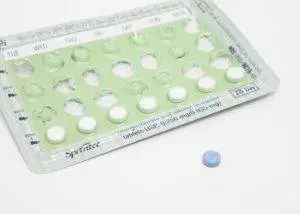
Many women have a hard time finding a proper diagnosis for their endometrial pain. Menstrual pain has been normalized to such an extent that it is often ignored, or just accepted, by both doctors and patients. Usually many other possible causes of the pain have to be ruled out before a woman is offered diagnostic testing especially for endometriosis. The usual type of pelvic exam is generally not helpful for spotting endometriosis. Ultrasound may detect large lesions, but imaging is not clear enough to see all endometrial growth. Getting a confirmed diagnosis involves a somewhat invasive laparoscopic procedure to detect cysts, lesions, or scar tissue. This is unfortunate, because early detection is the best way to prevent endometriosis from spreading and getting worse.
Conventional treatment for endometriosis focuses mainly on pain management with analgesic medications, and using hormones (birth control) to prevent further growth. Clearly, this is not helpful for women who want to get pregnant. When a woman is concerned with her fertility, and wants to conceive, then laparoscopic surgery to remove growths may be indicated.
How Does Acupuncture Treat Endometriosis?
According to TCM theory, endometriosis is considered a form of blood and Qi stagnation. We might classify this type of problem as Zheng Jia, in which blood stasis causes clotting or the formation of masses. PCOS, ovarian cysts, uterine fibroids, and reproductive cancers would also fit in this category. Other patterns can also cause dysmenorrhea (painful periods) and contribute to endometriosis.
Problems with the female reproductive system can present in a variety of ways:
- Qi stagnation with blood stagnation
- Yang deficiency with blood stagnation
- Qi sinking with blood stagnation
The reason for stagnation can be a blockage of liver Qi, often associated with feelings of anxiety. This is why stress management is so important. Blockages can also be caused by being in a cold environment, not dressing warmly enough, or drinking or eating cold things during the menstrual period. During the period, the organs need to be open; allowing the pelvic area to become too cold can restrict the flow, create stagnation, and contribute to the development of cysts, endometriosis, and/or fibroids.
Carefully considering the overall presentation of symptoms, an acupuncture practitioner will seek to determine the root cause of the Qi and blood stasis and develop a treatment protocol aimed at clearing stasis, increasing circulation, nourishing the uterus and ovaries, and regulating dysfunctional energies in other organs, such as the liver, kidneys, and spleen. Moxibustion may also be used to help bring heat energy to areas where stasis is caused by cold.
Acupuncture treatment in conjunction with individually formulated Chinese herb supplements and other modalities such as cupping is used to help move Qi and blood. Herbs help to bring in nutrients that people would not otherwise get in their diet; nourishing the ovary follicles, in particular, is vital for helping women with endometriosis overcome infertility problems.
A clinical trial at a hospital in China compared two groups of women with endometriosis: one group was given the synthetic steroid mifepristone, intended to reduce progesterone action. The other group was treated with acupuncture and herbs. The patients were checked via ultrasound to detect progress. The efficacy rate for reduction of endometrial growth was the same in both groups, suggesting that TCM methods were just as effective as steroids for improving the symptoms of endometriosis and halting its spread.
A systematic review of ten trials concluded that acupuncture treatment was effective for reducing endometriosis pain.
Both of the studies cited here also noted, via blood tests, a reduction in CA-125 levels in the women receiving acupuncture. Elevated CA-125 is a marker not only for more advanced stages of endometriosis and increased pelvic pain, but also for various types of female reproductive cancers.
Keep in mind that the effects of acupuncture treatment are cumulative; more benefits will be felt with regular treatment. There is no cure for endometriosis, but acupuncture and TCM can help significantly reduce pain, prevent the further development of endometrial tissue and scarring, and help improve fertility for women who want to start a family.
TCM not only treats symptoms and pain, but helps relieve stress, and increases the flow of Qi and blood, helping to manage all aspects of female reproductive health.
During childbearing age, the best way to help get rid of or manage endometriosis is to carry a pregnancy to term, because during pregnancy there is no period. When the ovaries and menstrual cycle get ten or so full months of resting time, there is a good potential for cysts, nodules, and lesions to go away. Good care will rid the body of the stagnation. Acupuncture and TCM allow us to treat endometriosis and infertility simultaneously, if pregnancy is a woman’s goal.
Top 5 Tips for Natural Relief of Endometriosis

In addition to acupuncture and TCM treatment, here are some natural remedies for endometriosis pain that you can try at home:
- Apply heat – warming energy can help relieve the painful symptoms of endometriosis. An electric heating pad, hot water bottle, or sock filled with rice and heated in the microwave, then applied to the abdomen or lower back can help relieve cramps.
- Drink plenty of water – dehydration intensifies cramping, so be sure to sip clean water throughout the day. Warm water particularly can help to thin the blood and keep it flowing smoothly.
- Plan ahead to give yourself extra down time – tracking your cycle and symptoms is important. When you know ahead of time that you are likely to be experiencing pain, plan to give yourself time off to rest. Taking extra pain medications or pushing through pain will only cause more exhaustion and anxiety.
- Period care – we recommend you use pads or period underwear more often than tampons during the menstrual period; use tampons only when the situation requires it (swimming, etc.). Also, do not engage in sexual intercourse during the heavy flow days of the period. Avoid anything that could block or reverse the flow of menstruation.
- Avoid caffeine and alcohol – some studies have shown that women who consume more of these substances are at higher risk for endometriosis (and many inflammatory conditions). While this doesn’t mean there is a direct link, it is still better to keep your intake of coffee and wine to a minimum. Avoid toxins in your food – food additives, pesticides, and chemicals in meat can trigger endometriosis symptoms. Focus on eating whole, natural foods and getting plenty of healthy Omega-3 fats from nuts, avocados, and high-quality fish or plant oils.
Above, there is also a good acupressure point to use when you are having painful cramping during menstruation, or to help relieve nausea from morning sickness.
Acupuncture Near Me for Endometriosis
At Art of Wellness, we have over 30 years of experience in managing women’s health issues. Our education and early practice gave us the opportunity to work with leaders in cutting-edge integrative medicine for women. Since 1997, we have worked with the top infertility ART providers in Los Angeles to give women the best in reproductive health care and fertility treatment. If you or someone you know is struggling with the pain of endometriosis or infertility, do not hesitate to call us and get started with an initial consultation.
*This article is for education from the perspective of Traditional Chinese Medicine only. The education provided by this article is not approved by FDA to diagnose, prevent, treat and cure human diseases. It should not stop you from consulting with your physician for your medical conditions. Traditional Chinese Medicine is based on Qi, which is an invisible force that usually cannot be observed by modern science. Because science focuses on testing ideas about the natural world with evidence obtained through observation, these aspects of acupuncture can’t be studied by science. Therefore acupuncture and Chinese herbs are often not supported by double-blind, randomized trials, and they are considered alternative medicine therapies in the United States.
How to Treat Polycystic Ovarian Syndrome (PCOS) With Acupuncture and TCM
By Xiaomei Cai, L.Ac., Ph.D.

Polycystic Ovarian Syndrome (PCOS) is a common hormonal condition that affects 10-20% of women during their reproductive years. PCOS is also one of the most prevalent causes of infertility among women. The primary problems of PCOS are hormonal imbalances and dysfunction of the ovaries. Women with PCOS have irregular or missing periods, anovulatory menstrual cycles, and elevated androgen and/or testosterone levels.
This condition is different that having one or a few ovarian cysts that become enlarged and may cause pain.
Medical interventions for PCOS often involve using birth control pills to stimulate regular menses, but this treatment does not address the issue at its source. Additionally, many women struggling with PCOS are actively trying to get pregnant, so contraceptive medications are not useful in these cases. TCM and acupuncture are able to help resolve many women’s health problems, including PCOS and the resulting infertility, restoring normal function to the female reproductive system without the side effects that medications can cause.
What Is PCOS?
PCOS is a syndrome, which means it is a collection of symptoms that occur together and help to define a disease even though its medical causes are not completely understood yet.
Most women with PCOS ovulate infrequently or not at all. Women with PCOS also might experience:
- Irregular Periods
- Menstrual cramps, heavy and/or painful periods
- Insulin resistance
- Obesity
- Excess hair on body and face (hirsutism)
- Thinning hair on head
- Acne, oily skin
- Abdominal bloating
PCOS is considered a disorder of both the reproductive and endocrine systems. The majority of women with PCOS also exhibit hyperandrogenemia – an excess amount of androgen hormones. In many cases, this condition starts early, when a girl is going through puberty. The problems begin to manifest shortly after a girl gets her first period (menarche).
Androgens are commonly referred to as the “male” sex hormones, although they naturally occur in both men and women, just in differing amounts. The primary androgens are testosterone and androstenedione. In women, androgens are produced by the ovaries and adrenal glands, whereas in men they are produced in the testes, usually in larger quantities. Hyperandrogenemia can be helped by weight loss, because adipose tissue (fat) itself is hormonally active, meaning the fat cells themselves also produce excess androgens.
Insulin resistance is also widespread among women with PCOS; about 85% of women with PCOS are insulin resistant, causing them to be at risk for Type 2 Diabetes. Sometimes women are prescribed Metformin to lower insulin and blood sugar levels.
PCOS Diagnosis
PCOS often goes undiagnosed for years. In many cases, women do not find out they have it until they are trying to get pregnant and then seek help for infertility. For most women, PCOS causes irregular periods. In these cases, women may go months without having a period, and then have a very heavy, painful period. Often, PCOS begins when girls are teens, and this condition causes them to struggle with being overweight, prone to getting pimples, and having extreme period pain (dysmenorrhea) and heavy periods that can cause embarrassing accidents. Girls may not realize that their experience is not normal, and may not talk to anyone about it. When they do seek help, they are usually prescribed birth control pills.
Birth control pills “regulate” the menstrual hormone cycle, causing a period to predictably start every 28 days. This use of contraceptives to “correct” menstrual problems and help clear acne during the teenage years leads to the masking of PCOS for many years–often until a woman is well into adulthood and ready to conceive. Then, when the birth control is stopped, the PCOS symptoms appear, which generally means that regular periods stop.
At this point, a firm diagnosis of PCOS is often reached after an internal ultrasound reveals the phenomenon which gives the syndrome its name: multiple small cysts forming around the edges of the ovaries. These fluid-filled bubbles, only a few millimeters in diameter, are partially formed eggs that have not been released. These cysts do not in and of themselves cause problems. Blood tests are done to find the high levels of androgens (testosterone) and also to measure the hormones involved in egg production and release. Women with PCOS often have higher levels of luteinizing hormone (LH), which triggers ovulation. The ratio of LH to FSH (follicle stimulation hormone) is higher in women with PCOS.
Conventional medicine provides the means to pinpoint the manifestations of PCOS in the body, hormonally and physically, but it does not offer much in the way of causal understanding or effective treatment.
TCM Perspective of PCOS
Traditional Chinese Medicine is based on the concepts of Qi, life force energy that travels through the body along meridians, and the balanced energies of Yin and Yang. Elemental pathogenic factors such as Wind/Cold, Dampness, Fire/Heat and Dryness come into play. Disease is created by either external or internal factors and can be discovered through diagnostic techniques of observation, inquiry, and palpation.
In a sense, TCM looks at all diseases as “syndromes.” In TCM, we do not look for one single cause of the symptom for which the patient is seeking relief. We look for other signs and symptoms that the patient may not have realized were related. We study the whole collection of indications and look for a pattern. An illness can be the result of any one of several different patterns.
When working with a patient who is experiencing reproductive and hormonal problems, a TCM provider will take into consideration the lab results of blood tests showing hormone levels, but will also be looking for clues as to what is happening throughout the organ systems of the body. In TCM, PCOS is categorized as a “Zheng Jia” diagnosis. Zheng Jia means “masses” (tumors), and includes uterine fibroids, endometriosis, ovarian cysts, and even reproductive cancers.
Internal factors are at the root of PCOS and other Zheng Jia disorders. Most clinical manifestations of PCOS arise from patterns of too much Dampness and Phlegm in the reproductive organs, which is what causes the fluid-filled cysts to form. This excess dampness is also what causes weight gain. Kidney deficiency contributes to the imbalances in hormone production. Blood deficiency causes absent or scanty periods, while blood stasis leads to painful periods.
Acupuncture and TCM for PCOS and Hormonal Imbalance in Women
Standard medical treatment for PCOS and infertility in women involves using medications to alter hormone levels: either OCP to regulate periods, Metformin to lower insulin, or Clomid or Letrozole to stimulate ovulation.
Acupuncture and TCM treatment for PCOS focuses on clearing excess dampness and phlegm from the uterus and other female reproductive organs, tonifying and nourishing the kidneys, invigorating the blood and clearing blood stasis. Electro-acupuncture has been shown to help facilitate natural ovulation.
A TCM provider will also focus on lifestyle and nutrition changes that will help alter the internal factors involved. Tracking basal body temperature can help both doctor and patient understand what is going on during the follicular and luteal phases of the menstrual cycle in each individual. Specially chosen combinations of herbs can be very helpful for making the subtle adjustments needed to normalize the hormones, increasing blood flow, and even balancing the emotions.
PCOS and Endometriosis
Endometriosis is another common women’s health problem in which uterine lining tissue begins growing outside of the uterus. It is estimated that about 10% of reproductive-age women have endometriosis, although we cannot be sure because, like PCOS, endometriosis is also often undiagnosed. It is not uncommon for women to have both conditions. When women with endometriosis have a menstrual period, there can also be bleeding in other parts of the abdomen. This can cause severe pain and create a lot of scar tissue in the pelvic region. Sometimes surgery is recommended to remove this scar tissue. This can help alleviate pain and increase the chances of conception, but it does not address the root problem, so the bleeding often recurs. Like PCOS, endometriosis can be a cause of infertility, making the use of birth control pills to control the hormones far from ideal.
According to TCM, endometriosis and PCOS are both Zheng Jia disorders; they are part and parcel of the same root problem. An acupuncturist can help correct both of these disorders, and the related infertility, all at the same time.
Integrative Medicine for PCOS and Infertility in Women
TCM has been using acupuncture and herbs to help women’s reproductive disorders and increase fertility for many centuries. In the past few decades, it has become increasingly common for patients to seek out acupuncture to help address infertility due to PCOS, both on its own and as an adjunct to Assisted Reproductive Technologies (ART). Studies have shown that acupuncture and herbal supplementation used in concert with infertility procedures such as Intrauterine Insemination (IUI) and In Vitro Fertilization (IVF) improve outcomes. Acupuncture treatment also helps to reduce the pain and anxiety many women experience while undergoing ART procedures, and pregnancy symptoms like morning sickness.
Top 5 Self-Care Tips for PCOS

One of the main internal factors causing the excess dampness and stasis of PCOS is too much cold in the body. Maintaining your warm energy is key. Habits like drinking ice cold beverages and eating ice cream, especially around the menstrual period, can really have a negative impact. It may seem old-fashioned, but a lot of the advice we associate with our grandmothers’ time still applies today.
- Dress appropriately for potentially chilly weather. Always bring your jacket with you.
- Avoid exercising to the point of sweating and then allowing yourself to get chilled. Change into dry clothes right after your workout.
- Keep the abdomen covered and warm.
- Don’t wear sandals or go barefoot when it is cold outside.
- Don’t go to bed with wet hair.
Acupuncture Near Me for PCOS
At Art of Wellness, our doctors have over 30 years of experience in the successful management of women’s health issues, including PCOS and infertility. In China, Dr. Cai practiced and taught at Chengdu University’s TCM Hospital as a gynecologist. During a two-year period of specialty training, she had the opportunity to study and work with some of China’s foremost experts, pioneers in integrative medicine for reproductive health.
Since 1997, Drs. Cai and Tan have brought their unique experience to Santa Monica and Los Angeles. Their knowledge of both Western medicine and Traditional Chinese Medicine allows them to recommend, when necessary, a mixture of medical modalities and to advise whatever course of treatment is most beneficial for each patient.
*This article is for education from the perspective of Traditional Chinese Medicine only. The education provided by this article is not approved by FDA to diagnose, prevent, treat and cure human diseases. It should not stop you from consulting with your physician for your medical conditions. Traditional Chinese Medicine is based on Qi, which is an invisible force that usually cannot be observed by modern science. Because science focuses on testing ideas about the natural world with evidence obtained through observation, these aspects of acupuncture can’t be studied by science. Therefore acupuncture and Chinese herbs are often not supported by double-blind, randomized trials, and they are considered alternative medicine therapies in the United States.